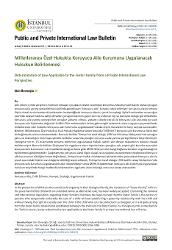| dc.contributor.author | Omeroglu, Ekin | |
| dc.date.accessioned | 2023-10-19T15:11:58Z | |
| dc.date.available | 2023-10-19T15:11:58Z | |
| dc.date.issued | 2022 | |
| dc.identifier.issn | 2651-5377 | |
| dc.identifier.issn | 2667-4114 | |
| dc.identifier.uri | https://doi.org/10.26650/ppil.2022.42.1.982291 | |
| dc.identifier.uri | 1116088 | |
| dc.identifier.uri | https://hdl.handle.net/20.500.12469/5298 | |
| dc.description.abstract | In the protection of children who cannot be brought up in their biological family, the institution of foster family, which is the placement of the child with an unrelated family as alternative care, has been widely accepted. Examining the national and international regulations regarding foster families illustrates the legal concept that the foster family is the person or persons who temporarily undertake the care of a child without establishing a paternity relationship with the child and without having the right of custody over the child. If the child who is to be protected is a foreigner, or if a dispute arising from the foster family relationship established between the child and the foster family in a foreign country comes before the Turkish courts, issues related to the law applicable to the foster family in private international law will arise. As a matter of fact, there is at present no conflict of laws rule regarding the foster family in the Turkish Private International Law Act (TPILA). However, in the Hague Convention of 1996, to which Turkey is a party, placement of the child in a foster family was regulated among the various measures aimed at protecting the person and property of the child. According to Article 15 of the Hague Convention, the authorities of the Contracting States must apply their own law. On the other hand, certain issues, such as how the foster family should be qualified and the name and surname of the child are considered outside the scope of the Convention. In our study, the nature of the foster family will be briefly examined through the national and international regulations regarding the institution of the foster family. After examining the applicable law, an answer will be sought to the question of which article will be applicable in determining the law to be applied to the foster family in terms of TPILA. | en_US |
| dc.language.iso | tur | en_US |
| dc.publisher | Istanbul Univ | en_US |
| dc.relation.ispartof | Public and Private International Law Bulletin | en_US |
| dc.rights | info:eu-repo/semantics/openAccess | en_US |
| dc.subject | Foster Family | en_US |
| dc.subject | Adoption | en_US |
| dc.subject | Guardianship | en_US |
| dc.subject | Paternity | en_US |
| dc.subject | Applicable Law | en_US |
| dc.title | Determination of Law Applicable to the Foster Family from a Private International Law Perspective | en_US |
| dc.type | article | en_US |
| dc.identifier.startpage | 1 | en_US |
| dc.identifier.endpage | 25 | en_US |
| dc.identifier.issue | 1 | en_US |
| dc.identifier.volume | 42 | en_US |
| dc.department | N/A | en_US |
| dc.identifier.wos | WOS:000888186200001 | en_US |
| dc.identifier.doi | 10.26650/ppil.2022.42.1.982291 | en_US |
| dc.institutionauthor | Omeroglu, Ekin | |
| dc.relation.publicationcategory | Makale - Uluslararası Hakemli Dergi - Kurum Öğretim Elemanı | en_US |
| dc.identifier.trdizinid | https://search.trdizin.gov.tr/yayin/detay/1116088 | en_US |
| dc.khas | 20231019-WoS | en_US |
















